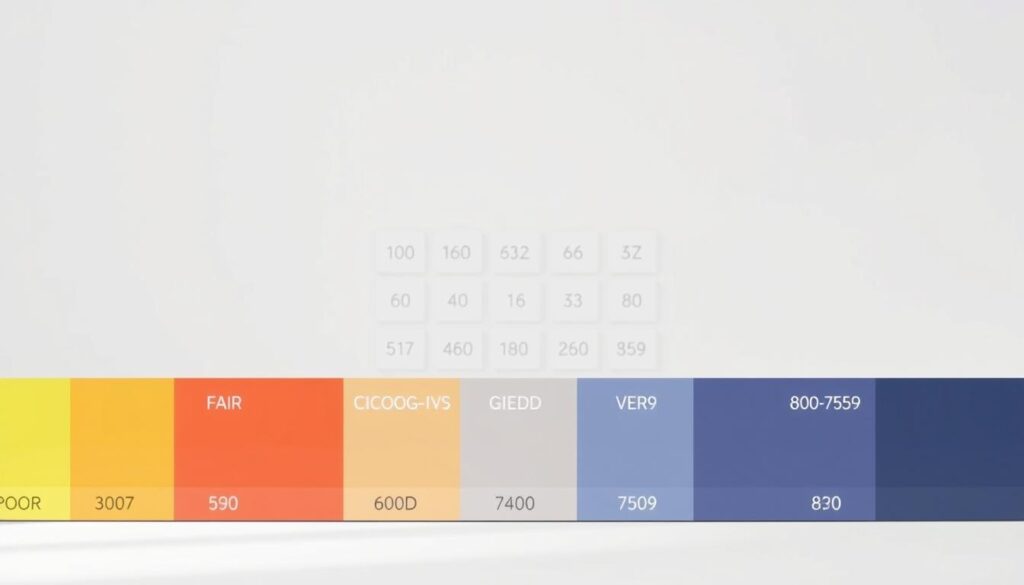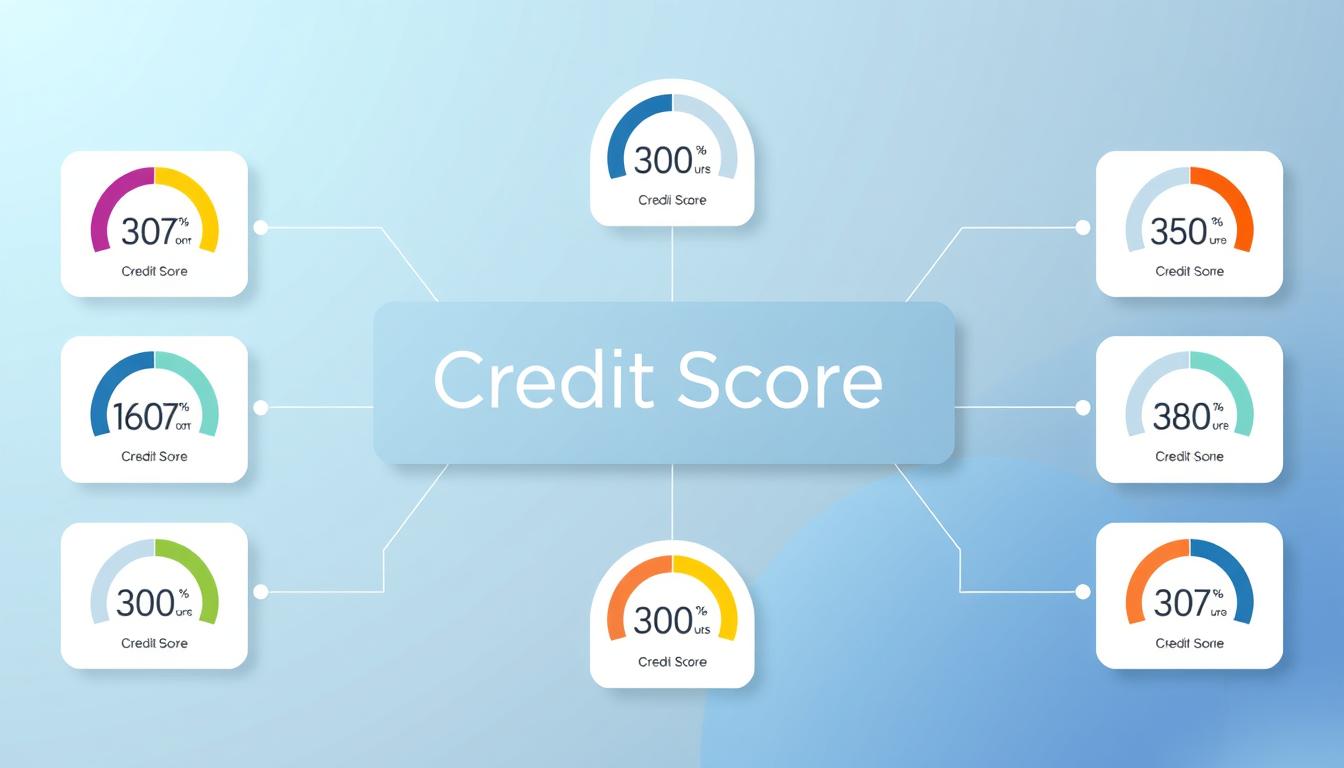A good credit score is key for your financial health. It affects loan approvals and interest rates. But, what exactly is a good credit score?
Your credit score is a three-digit number. It’s based on your credit history, like payment history and credit use. Knowing credit score ranges is important to see where you are.
Understanding your credit score helps you make better financial choices. A credit rating guide can give you insights into what affects your score. This way, you can work on improving it over time.
Key Takeaways
- Understanding your credit score is vital for financial health.
- Credit scores are calculated based on credit history.
- Knowing your credit score range helps you make informed decisions.
- A good credit score can influence loan approvals and interest rates.
- Improving your credit score requires understanding the factors that affect it.
The Fundamentals of Credit Scores
Knowing how credit scores work is key to keeping your finances in check. A credit score is a big deal for lenders. It shows if you’re a good risk for them.
What Is a Credit Score?
A credit score is a three-digit number that shows how trustworthy you are with money. Lenders use it to decide if they should lend to you. It’s based on your past borrowing and paying back on time. The most common score is the FICO score, which goes from 300 to 850.

How Credit Scores Are Calculated
Credit scores are made up of a few key things. Payment history and credit utilization are the biggest parts. Payment history is 35% of your score, showing if you pay on time. Credit utilization is 30%, showing how much credit you use compared to what you have.
Other parts include how long you’ve had credit, the types of credit you have, and new credit checks. Knowing these can help you improve your credit score over time.
What Is a Good Credit Score?
The idea of a good credit score changes with different scoring models like FICO and VantageScore. It’s key to know these models to see how healthy your credit is.
A good credit score isn’t the same for everyone. It depends on the scoring model used. The most common models are FICO and VantageScore. They both check how creditworthy you are but use different criteria and score ranges.
FICO Score Ranges
The FICO score is the most used credit score, ranging from 300 to 850. Here’s how FICO scores are divided:
- Poor: 300-579
- Fair: 580-669
- Good: 670-739
- Very Good: 740-799
- Excellent: 800-850
For FICO, a score over 670 is usually good. Scores over 800 are excellent.

VantageScore Ranges
VantageScore also ranges from 300 to 850 but categorizes differently:
- Poor: 300-600
- Fair: 601-660
- Good: 661-780
- Excellent: 781-850
For VantageScore, a score of 661 or higher is good. Scores above 781 are excellent.
Knowing these ranges helps you understand your credit health. It guides you to make better financial choices. By knowing what a good credit score is, you can improve your financial decisions.
Breaking Down Credit Score Categories
Knowing your credit score category is key to managing your finances well. Credit scores fall into different ranges. Each range affects loan approvals, interest rates, and more.
Poor Credit (300-579)
A score between 300 and 579 is considered poor. People with poor credit may find it hard to get loans or credit cards. If they do get approved, they might face high interest rates. To build credit, fixing the issues that led to the low score is crucial.
Fair Credit (580-669)
Fair credit scores are from 580 to 669. Getting credit is easier with a fair score, but interest rates might still be high. To improve your score, follow credit score tips like paying off debt and making payments on time.
Good Credit (670-739)
Good credit scores are 670 to 739. With a good score, you’re more likely to get better loan terms and lower interest rates. Keeping up good credit habits will continue to benefit you.
Very Good Credit (740-799)
Very good credit scores are 740 to 799. People in this range are seen as low-risk borrowers. They often qualify for the best interest rates. Staying on track with credit score tips will help keep this status.
Excellent Credit (800-850)
An excellent credit score is 800 or higher. This shows you manage your credit exceptionally well. You’ll likely get the best loan terms and lowest interest rates.
Here’s a quick look at the credit score categories:
| Credit Score Range | Category | Implications |
|---|---|---|
| 300-579 | Poor | High risk, high interest rates |
| 580-669 | Fair | Better loan terms possible with improvement |
| 670-739 | Good | Qualify for good loan terms |
| 740-799 | Very Good | Low-risk borrower, best interest rates |
| 800-850 | Excellent | Exceptional credit management, best loan terms |
Understanding and managing your credit score category is vital for good financial health. By knowing your score and following credit score tips, you can aim for a better score. This opens up many benefits.
The Five Factors That Determine Your Credit Score
To manage your credit well, knowing what affects your score is key. Your credit score is based on several important factors. Each factor has a different weight in your overall score.
Payment History (35%)
Payment history is the biggest factor, making up 35% of your score. It shows if you pay bills on time. Late payments and bankruptcies can hurt this part. To improve credit score, pay bills on time and fix any past due accounts.
Credit Utilization (30%)
Credit utilization is 30% of your score. It’s about how much credit you use compared to what’s available. Keeping this ratio under 30% is good. For example, if you have a $1,000 limit, aim for a balance under $300. This shows lenders you can handle your credit well, a key credit score tip.
Length of Credit History (15%)
The length of your credit history is 15% of your score. A longer history is better, showing more about your credit habits. This includes how long your oldest account is open and the average age of all accounts. Keeping older accounts can help improve your fico score.
Credit Mix (10%)
Credit mix is 10% of your score. It’s about the variety of credit you have, like credit cards and loans. Having a mix can help your score, showing you can handle different types of credit well.
New Credit (10%)
New credit inquiries and accounts make up the last 10% of your score. Applying for too much credit at once can hurt your score. It may seem like you’re at higher risk of not paying back. Be careful when applying for new credit to avoid harming your score.
Knowing these five factors and their impact on your score is vital. By focusing on these areas and adopting good credit habits, you can improve your score over time.
How Your Credit Score Impacts Your Financial Life
Your credit score has a big impact on your financial life. It affects loan approvals and interest rates. A good score can lead to better financial opportunities. But a poor score can mean higher interest rates and stricter loan terms.
Loan Approvals and Interest Rates
Your credit score is key in loan approvals and interest rates. A higher credit score means lower interest rates. This can save you thousands over time. For example, a score of 750 or higher usually gets you the best rates.
Credit Card Approvals and Limits
Credit card issuers check your credit score. A good score can get you higher credit limits and better rewards. But a lower score might mean lower limits or even rejection.
Housing: Mortgages and Rentals
Your credit score affects mortgage and rental chances. Landlords and lenders use scores to judge risk. A good score can help qualify for a mortgage or your dream home.
Insurance Premiums
Insurance companies might look at your credit score too. A higher score can lower insurance costs. It shows you handle money well.
Employment Opportunities
While indirect, your credit score can influence jobs, especially in finance. Some employers check scores to see if you’re financially responsible.
In summary, a good credit score is vital for your financial health. Knowing its impact helps you build credit and improve your finances.
Strategies to Improve Your Credit Score
Improving your credit score needs knowledge and planning. Knowing what affects your score helps you take action to improve it.
Pay Bills on Time, Every Time
Payment history is a big part of your credit score. Paying bills on time is key. Use payment reminders or automate your payments to stay on track. Late payments hurt your score, so make timely payments a habit.
Reduce Your Credit Utilization Ratio
Your credit utilization ratio is also important. Try to keep your credit card balances below 30% of your credit limit. Paying down debt or getting a higher credit limit can help. This shows lenders you can handle your credit well.
Limit Hard Inquiries
Too many credit card or loan applications can lower your score. Apply only when necessary to avoid this. It’s smart to compare rates quickly to reduce the impact of inquiries.
Address Negative Items on Your Credit Report
Negative items like collections or late payments hurt your score. Check your credit report often and correct any mistakes. Fixing these issues can improve your score over time.
Become an Authorized User
Being an authorized user on a good credit account can boost your score. Make sure the main account holder pays on time to benefit your report. But, be careful, negative activity on the account can harm you too.
Credit-Building Tools for Those Starting Out
For those new to credit, knowing the tools available can greatly help. Building credit needs a smart plan. The right tools can make this easier.
Secured Credit Cards
Secured credit cards are great for starting to build credit. You need to put down a deposit, which becomes your credit limit. This makes them safer for lenders. Using a secured card well shows you can handle credit responsibly.
Credit-Builder Loans
Credit-builder loans are made for building credit. They keep your loan money in a savings account or CD until you pay it back. This helps you build a good payment history.
Retail and Store Credit Cards
Retail and store credit cards are easier to get than regular cards. But, they usually have higher interest rates. So, it’s important to use them carefully.
Student Credit Cards
Student credit cards are for students who are new to credit. They have easier approval rules. They help students start building their credit history.
| Credit-Building Tool | Key Features | Benefits |
|---|---|---|
| Secured Credit Cards | Requires security deposit, credit limit equals deposit | Helps build credit, less risky for lenders |
| Credit-Builder Loans | Holds loan amount until repaid | Establishes positive payment history |
| Retail and Store Credit Cards | Easier to obtain, often higher interest rates | Viable for those starting out, requires responsible use |
| Student Credit Cards | Lenient approval requirements | Helps students establish credit history |
Understanding and using these credit-building tools is a good start. It helps you work towards a better credit score 2025 and a brighter financial future. A credit rating guide can also offer helpful tips for keeping and improving your credit score.
Common Credit Score Myths Debunked
There’s a lot of confusion about credit scores. It’s time to clear up the myths. Many people make financial choices based on wrong ideas about credit scores. Knowing the truth can help you manage your money better.
Checking Your Own Score Lowers It
Many think checking your own score lowers it. But this is not true. When you check your score yourself, it’s a soft inquiry. This doesn’t hurt your score. Only hard inquiries from lenders can lower your score.
Closing Old Accounts Helps Your Score
Some believe closing old accounts boosts your score. But it can actually hurt your score. Closing accounts shortens your credit history and might raise your credit use ratio.
You Need to Carry a Balance to Build Credit
Carrying a balance is not needed to build credit. In fact, paying off your balance each month shows you’re responsible. This can improve your FICO score.
All Credit Scores Are the Same
Not all credit scores are the same. FICO and VantageScore use different models and can give different scores. Knowing these differences is key to managing your credit well.
By debunking these myths, you can better manage your credit score. For more credit score tips, regularly check your credit report and keep good credit habits.
Monitoring and Maintaining Your Credit Score
Keeping a good credit score is vital for your financial health. It’s important to check it regularly. Your credit score affects your ability to get loans, credit cards, and even the interest rates you get.
How to Check Your Credit Score for Free
You can get your credit score for free online. Many websites and credit card companies offer this service. AnnualCreditReport.com is a great place to get your free credit reports from Equifax, Experian, and TransUnion.
How Often to Monitor Your Credit
It’s a good idea to check your credit score at least once a year. But, if you’re planning to apply for credit or have been a victim of identity theft, you might want to check more often. Regular checks help you keep an eye on your credit and spot any problems quickly.
Setting Up Fraud Alerts and Credit Freezes
To protect your credit, think about setting up fraud alerts or credit freezes. A fraud alert makes lenders check your identity before giving you credit. A credit freeze blocks anyone from seeing your credit report. Both can stop identity theft and unauthorized credit checks.
| Action | Description | Benefit |
|---|---|---|
| Check Credit Score | Obtain your free credit score from reputable sources. | Understand your current credit standing. |
| Monitor Regularly | Check your credit score at least once a year. | Quickly identify potential credit issues. |
| Set Up Fraud Alerts | Notify lenders to verify your identity. | Prevent identity theft and unauthorized credit. |
Conclusion: Your Path to Better Credit
Understanding and managing your credit score is key to a healthy financial life. Knowing the credit score ranges helps you secure loans and credit cards better. This knowledge lets you take steps to get a good credit score.
To build credit, make timely payments and keep your credit utilization ratio low. Also, limit hard inquiries. Regularly check your credit report and fix any negative items to boost your score.
By using the strategies from this article, you can improve your financial health. Enjoy better loan terms, lower interest rates, and more financial freedom. Start managing your credit score today for a stronger financial future.




